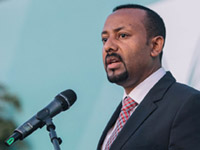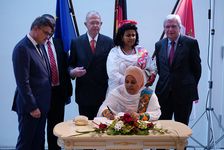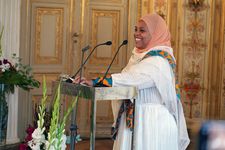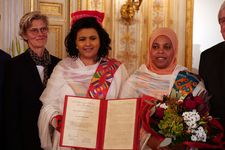Withdrawal of the Hessian Peace Award 2019
The Board of Trustees of the Albert Osswald Foundation decided in December 2021 to withdraw the Hessian Peace Award presented to Ethiopian Prime Minister Abiy Ahmed in 2019. The Board of Trustees based its decision, which became public during the press conference on the 2022 Hessian Peace Award, on the conflict in Ethiopia's Tigray province. It is the first time in the history of the prize that the Board of Trustees has made such a decision.
Ethiopian Prime Minister Abiy Ahmed received first the 2019 Hesse Peace Prize and later the Nobel Peace Prize for his efforts to reach a historic peace deal with neighboring Eritrea in 2018 after a two-decade conflict, as well as his domestic reform efforts to liberalize the country. The civil war in the Tigray region in the north of the country began in November 2020, with peace negotiations leading to a ceasefire in the fall of 2022. During the conflict, the Ethiopian government led by Abiy Ahmed shared responsibility for the escalation of violence through its policies, which were accompanied by the most serious human rights violations.
Human rights violations in Ethiopia
The Board of Trustees has closely followed the conflict in the Tigray region since it broke out in November 2020, although access to information in the ongoing conflict has been difficult, even for the research institutions represented on the Board. In December 2021, at the initiative of the European Union, the United Nations Human Rights Council decided to establish a Commission of Inquiry to investigate human rights violations in the region. This decision by the Human Rights Council was based on verified evidence of the most serious human rights violations and violations of international humanitarian law by all parties to the conflict.
Reason for the withdrawal
The Hessian Peace Award is given for achievements or efforts that are in the past, but are linked to hopes and expectations that reach into the future. The awarding of the prize to the Ethiopian Prime Minister in 2019 was linked to the hope that he would continue his efforts for peace on the African continent in the future and advance the liberalization of Ethiopia. It is in line with the idea of the award to not only recognize efforts to achieve negative peace and the absence of violence, but to recognize commitment to positive peace that promotes human rights, reconciliation, and addressing injustice. The Ethiopian government under Prime Minister Ahmed did not contribute to peace in 2020 and 2021, but proved part of the escalating violence, according to the Trustees. The country's reform course was revised by a return to an authoritarian style of government. This undermines the intentions with which the prize was awarded and justifies the decision to withdraw the prize. The decision of the Board of Trustees aims to protect the prize as well as past and future laureates. There will be no reclaiming of the prize money associated with the award.
Hessian Peace Prize 2019: Abiy Ahmed

The prize honors Abiy Ahmed Ali's outstanding achievement for a historic peace declaration with the arch-enemy Eritrea. A 20-year conflict that has cost the lives of more than 100,000 people and has flared up again and again in recent years seems to be coming to a peaceful end. A process of reconciliation between the two states offers opportunities for the societies of both states and the East African region. These important developments and the resulting opportunities for a peaceful future are worthy of recognition. "Abiy Ahmed Ali is one of the great hopes on the African continent. We want to honor his commitment to peace with the Hessian Peace Prize and at the same time continue to promote it," said Nicole Deitelhoff, Head of PRIF and member of the Board of Trustees.
The peace agreement and the reconciliation of the two neighbouring states based on it raise hopes for the stabilization of the entire region. The changes introduced by Abiy Ahmed Ali are also noteworthy domestically: since Emperor Haile Selassie was overthrown in 1974, there has been no change of government in the country without bloodshed. The single party "Revolutionary Democratic Front of the Ethiopian Peoples" (EPRDF), which has been in power since 1991, is closely interwoven with the Ethiopian state, controls all levels of the federal system and has repeatedly, relied on repression. Abiy's government is also supported by this coalition, but in the last year and a half it has made significant progress in political and economic liberalization. The increased public attention that followed the award of the Hessian Peace Prize could serve as a reminder not to stop now but to press ahead with these domestic reforms peacefully and integratively.
Abiy Ahmed Ali, born 1976 in Beshasha, Ethiopia, appointed Prime Minister of Ethiopia in April 2018. He belongs to the ethnic group of Oromo, who have long perceived themselves as marginalized in Ethiopia's political system. He is the first Oromo to become Prime Minister.
A former soldier in the Ethiopian army, he studied computer and communications technology, cryptography, transformational leadership and business administration and received a doctorate in management and leadership from the University of Addis Ababa in 2017. He served in the Eritrean-Ethiopian border war from 1998 to 2000 and was Deputy Director of the Information Network Security Agency (INSA), a secret service agency that monitors telecommunications and the Internet in Ethiopia, from 2007 to 2010.
He has been a member of the Ethiopian Parliament since 2010 and was Minister of Science from 2015 to 2016. He is a member of the political group of the Democratic Organization of the People of Oromo (OPDO), which is part of the single ruling party EPRDF. Since March 2018 he has been Chairman of the EPRDF. At 42, he is the youngest head of government in Africa.
The award ceremony took place on September 23rd, 2019. On behalf of Abiy Ahmed, Ethiopia's minister of peace, Muferihat Kamil, accepted the award. Hessian Prime Minister Volker Bouffier delivered the laudatory speech.


